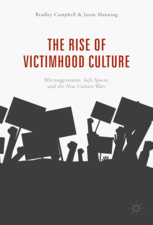Description
The Rise of Victimhood Culture, 1st ed. 2018
Microaggressions, Safe Spaces, and the New Culture Wars
Authors: Campbell Bradley, Manning Jason
Language: English
Subject for The Rise of Victimhood Culture:
40.08 €
In Print (Delivery period: 15 days).
Add to cart
Publication date: 02-2018
278 p. · 14.8x21 cm · Paperback
278 p. · 14.8x21 cm · Paperback
Description
/li>Contents
/li>Biography
/li>Comment
/li>
The Rise of Victimhood Culture offers a framework for understanding recent moral conflicts at U.S. universities, which have bled into society at large. These are not the familiar clashes between liberals and conservatives or the religious and the secular: instead, they are clashes between a new moral culture?victimhood culture?and a more traditional culture of dignity. Even as students increasingly demand trigger warnings and ?safe spaces,? many young people are quick to police the words and deeds of others, who in turn claim that political correctness has run amok. Interestingly, members of both camps often consider themselves victims of the other. In tracking the rise of victimhood culture, Bradley Campbell and Jason Manning help to decode an often dizzying cultural milieu, from campus riots over conservative speakers and debates around free speech to the election of Donald Trump.
1. Microaggression and the Culture of Victimhood.- 2. Microaggression and the Structure of Victimhood.- 3. Trigger Warnings, Safe Spaces, and the Language of Victimhood.- 4. False Accusations, Moral Panics, and the Manufacture of Victimhood.- 5. Opposition, Imitation, and the Spread of Victimhood.- 6. Sociology, Social Justice, and Victimhood.- 7. Victimhood, Academic Freedom, and Free Speech.- 8. Conclusion.
Bradley Campbell is Professor of Sociology at California State University, Los Angeles, USA.
Jason Manning is Associate Professor of Sociology at West Virginia University, USA.
A timely intervention in the hot-button topics of free speech and political correctness Accessibly engages with the sociological and cultural concerns arising from recent events on college campus and in wider society Relevant to an array of disciplines including sociology, culture and media studies, psychology, politics, and American studies
© 2024 LAVOISIER S.A.S.
These books may interest you

Cultural Practices of Victimhood 160.25 €

Cultural Practices of Victimhood 50.12 €

